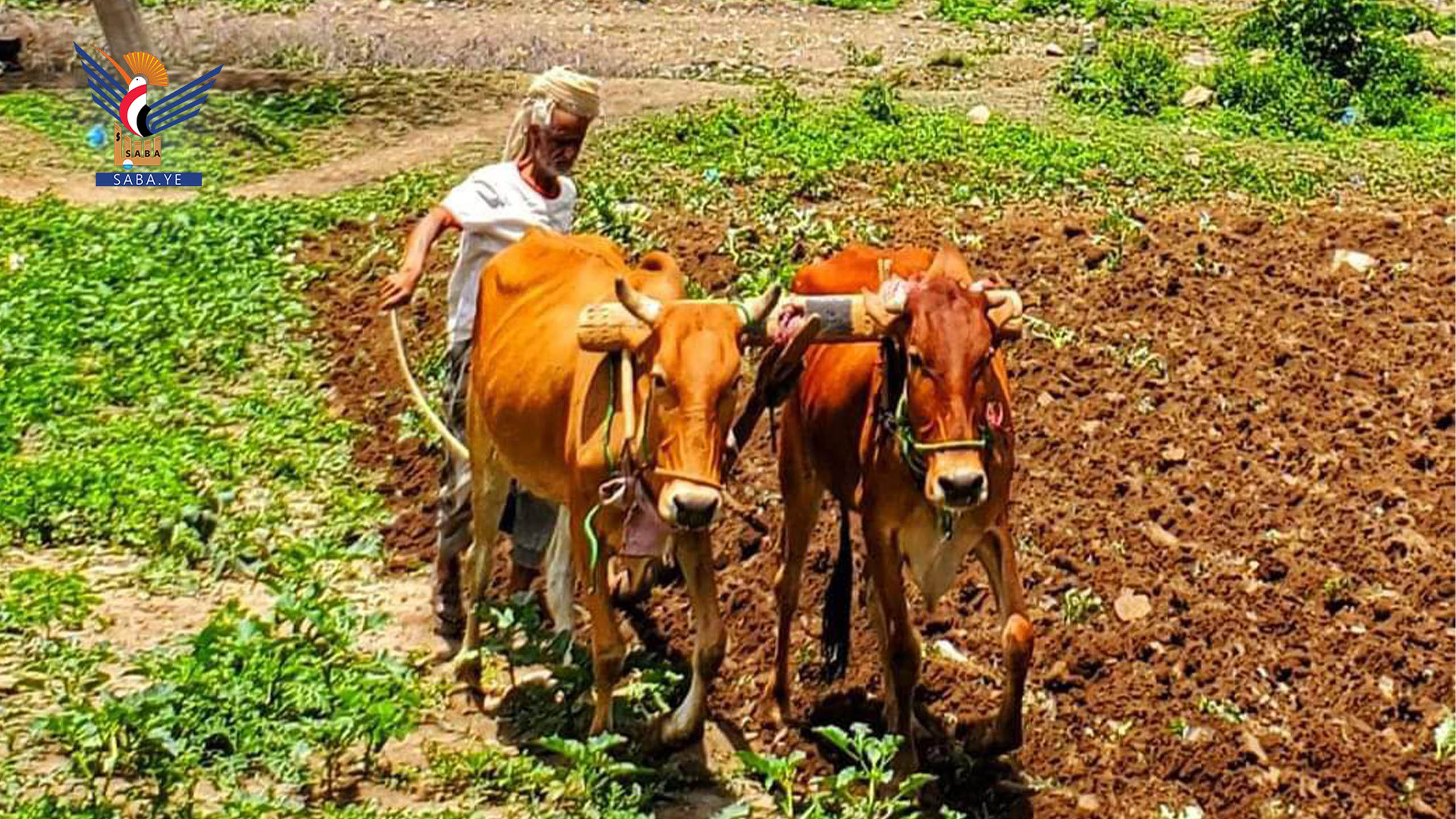SANA'A - SABA :
The glorious September 21 Revolution brought about real transformations in the process of advancing the agricultural sector in the country, to achieve self-sufficiency and economic independence.
This revolution came to make a transformation in the life of the Yemenis after decades of dependence on the forces of hegemony and corruption, which squandered the country's wealth and destroyed its economic sectors, and this transformation was embodied in the breakthrough witnessed by the agricultural sector since the early years of the revolution.
The revolutionary leadership was keen to adopt the basic guidelines adopted by the government and translate them into plans and strategies aimed at doubling production and creating a comprehensive agricultural renaissance to ensure that the Yemeni people's food needs are met.
As a result of these wise directives, self-sufficiency has become a strategic goal that topped the national economic recovery programs launched by the Supreme Political Council to overcome the economic effects of the aggression , blockade and to reduce the importation of grains and agricultural products from abroad.
Comprehensive targeting:
For decades, the agricultural sector suffered from systematic targeting, which made it paralyzed and unable to meet the needs of citizens in terms of food products, and the culture of consumption and promotion of foreign products prevailed.
The targeting of this sector remained prevalent until the September 21 Revolution, which culminated in a series of steps that charted the course of transformation in agricultural policy and laid the foundations of the infrastructure to advance this sector as one of the most important economic sectors to achieve food security for the Yemenis.
Wise leadership and vision:
Freedom from economic dependence and foreign dependence can only be achieved by advancing the agricultural sector and achieving food security, which is what the revolutionary leadership and the Supreme Political Council emphasize as one of the most important goals of the September 21st Revolution.
To achieve this goal, official and popular efforts have been made to raise awareness of the importance of moving towards agriculture, utilizing rainwater and increasing production of various agricultural crops, especially grains and other crops related to food security, in order to achieve the nation's sovereign decision-making away from foreign dictates.
A strategic goal:
During the past decades, the agricultural sector was marginalized and systematically destroyed, and Yemen turned from a self-sufficient country to a country that imports more than 95 percent of its food needs, but this situation did not continue after the September 21 Revolution, which restored the agricultural sector to its place and made self-sufficiency one of its strategic goals.
In this context, Minister of Agriculture, Fisheries and Water Resources Dr. Radwan Al-Rabaei explained that September 21 was a popular and liberating revolution that emerged from the suffering of the Yemenis, who drew its course and defined its goals, and distinguished it from other revolutions by being purely Yemeni, without any foreign agenda interfering in it, and started from the faith identity of the Yemeni people to achieve freedom , independence and get rid of the tutelage and hegemony of foreign powers.
He pointed out that achieving self-sufficiency is one of the goals of the young revolution, which was embodied through the serious approach to advancing the agricultural sector, which received attention and follow-up from the revolutionary leadership and came at the top of its priorities.
Dr. Al-Rabaei praised the role of all employees of the agricultural sector and their steadfastness in performing their duties and tasks, despite the blockade and aggression that sought to destroy the agricultural sector and caused the destruction of its infrastructure , direct , indirect economic damage and losses that exceeded $142 billion.
He pointed out that great achievements have been made thanks to the directives of the Revolution Leader and the Yemenis' steadfastness, who rolled up their sleeves and moved towards implementing initiatives according to the methodology of community participation, government support and utilization of available resources.
Community initiatives:
In implementation of the wise directives of the leadership and in coordination with rural development partners, led by the Bunyan Development Foundation, the Agricultural Cooperative Union, associations and local authorities, more than 20,000 community initiatives have been qualified, which is one of the fruits of the September 21 revolution, and many initiatives have been implemented by volunteers at the village level as well as community groups and components in various fields, including the agricultural aspect.
He pointed out that community initiatives are many and varied and not limited to the agricultural aspect only, but there are other development initiatives, including roads, schools, health centers and irrigation, as the value of what has been implemented from the start of the revolution until 2023, exceeded more than sixty billion riyals.
Grain and wheat farming:
Over the past decades, the country has witnessed a systematic targeting of the crop map, shifting from the cultivation of staple crops to less important crops, according to a report by the Ministry of Agriculture, Fisheries and Water Resources.
According to a report issued by the Ministry of Agriculture, Fisheries and Water Resources, the total amount of wheat imported from abroad amounts to more than three million tons.
Since the September 21 Revolution, the country has been able to achieve self-sufficiency in sorghum and millet crops, whose imports have been stopped, and there is a trend to focus on wheat cultivation as a priority in implementation of the directives of the revolution leader, Sayyed Abdulmalik Badr al-Din al-Houthi, which urges attention to crops related to the country's food and national security.
Efforts continue to exploit the country's agricultural assets to expand the cultivation of wheat in the central and northern highlands and in the eastern regions to increase productivity of this important crop.
This approach is one of the fruits of the September 21 revolution, which broke the restrictions imposed by the World Bank and foreign organizations as part of a foreign conspiracy targeting the agricultural sector and food security sources in a desperate attempt to make the country a food colony.
He pointed out that the revolution exposed the conspiracies of the World Bank and foreign organizations that were publishing reports , studies and promoting them that Yemen is prone to drought and cannot grow wheat, and that it is not feasible and has no economic benefit.
The Agriculture Minister said, "By the grace of God, we have a trend to grow wheat until we achieve self-sufficiency, and we have many experiences in growing wheat in the winter seasons in Tihama and there are promising results, and we aspire during the next season to find model farms for growing wheat in Tihama."
He said there are plans to grow wheat and legumes in the central and northern highlands and eastern regions, and to grow maize and legumes in Tihama, to fill the food gap from these crops.
Contract farming:
Contract farming is one of the most important agricultural projects launched in August 2020 in implementation of the Revolution Leader's directives, and the Agriculture Ministry has achieved successes in this aspect as a result of the existence of community awareness of the importance of contract farming as one of the modern marketing systems.
According to specialists in agricultural marketing, eight contract farming companies have been established, each company specializes in a field of agricultural products, whether grains, legumes, nuts, some in poultry, feed, others in agricultural inputs, a livestock company, and until 2023, more than 60 contracts were completed with associations and agricultural producers in the Levantine corn crop, and 4,200 tons were contracted.
In the garlic crop, five thousand tons were contracted and purchased, legumes were contracted for one thousand and 200 tons, dates were agreed with agents to buy two thousand and 500 tons, raisins were purchased 125 tons, as well as in pomegranates, apples and mangoes.
According to specialists, contract farming contributed to reducing the import bill in some agricultural products by varying percentages, some of which exceeded what was planned, such as garlic, whose import bill decreased to 100%, raisins 70%, poultry 20%, dates 15%, and turning the import bill in favor of the Yemeni farmer.
Attention to water resources:
Water is one of the most important elements of agriculture, and from this point of view, the ministry has been keen to utilize rainwater and create many barriers of various kinds, whether at the individual, collective, cooperative or community level.
According to a report issued by the Ministry of Agriculture, the achievements made since the start of the September 21 revolution have been divided into two tracks: The first is for construction and the second is emergency, where the assessment of water facilities in seventy districts has been completed in terms of their economic feasibility and their need for maintenance work, in addition to proposing new facilities and water barriers.
Water map:
Dr. Radwan Al-Rabaei confirmed that there is a digital water map that includes the preparation of irrigation guides for the water facility in the various directorates, so that this map helps to identify sites and areas in need of water projects and facilities with the aim of focusing on supporting them, as the provision of water is one of the most important factors contributing to agricultural expansion.
He pointed out that 91 water facilities, including a dam, barrier, caravan and canal, have been constructed through community initiatives, in addition to 105 irrigation facilities that were funded by the Agricultural Projects and Initiatives Financing Unit in the Secretariat and the provinces, and 130 water facilities were rehabilitated, maintained and restored through community initiatives.
Within the framework of the emergency track, two emergency irrigation programs were implemented in Tihama and Al-Jawf, and the irrigated areas reached 126,000 acres in Tihama, and water reached areas that were deprived for decades, and this project aims to irrigate more than 127,216 hectares.
Desert Cultivation Project:
The desert cultivation project in Al-Jawf is one of the fruits of the emergency irrigation program, which is represented in the introduction of cultivation of hard and desert lands to take advantage of rainwater and expand the cultivation of the largest possible area of land with various crops and grains.
Attention to livestock:
Livestock is one of the sources of food security in the country, representing 23 percent of the general output of the agricultural sector, as it is a source of income for a large percentage of Yemeni families.
This sector receives wide attention, and there is a trend to preserve and develop this wealth due to its economic importance, through attention to the health of livestock through the General Department of Animal Health and Veterinary Quarantine, activating the Central Veterinary Inspection Laboratory, preventing the slaughter of young and female livestock in cooperation with the General Organization for Slaughterhouses and Meat Markets, implementing veterinary vaccination campaigns for livestock, in addition to many interventions to support and develop this sector.

| more of (Reports) |




